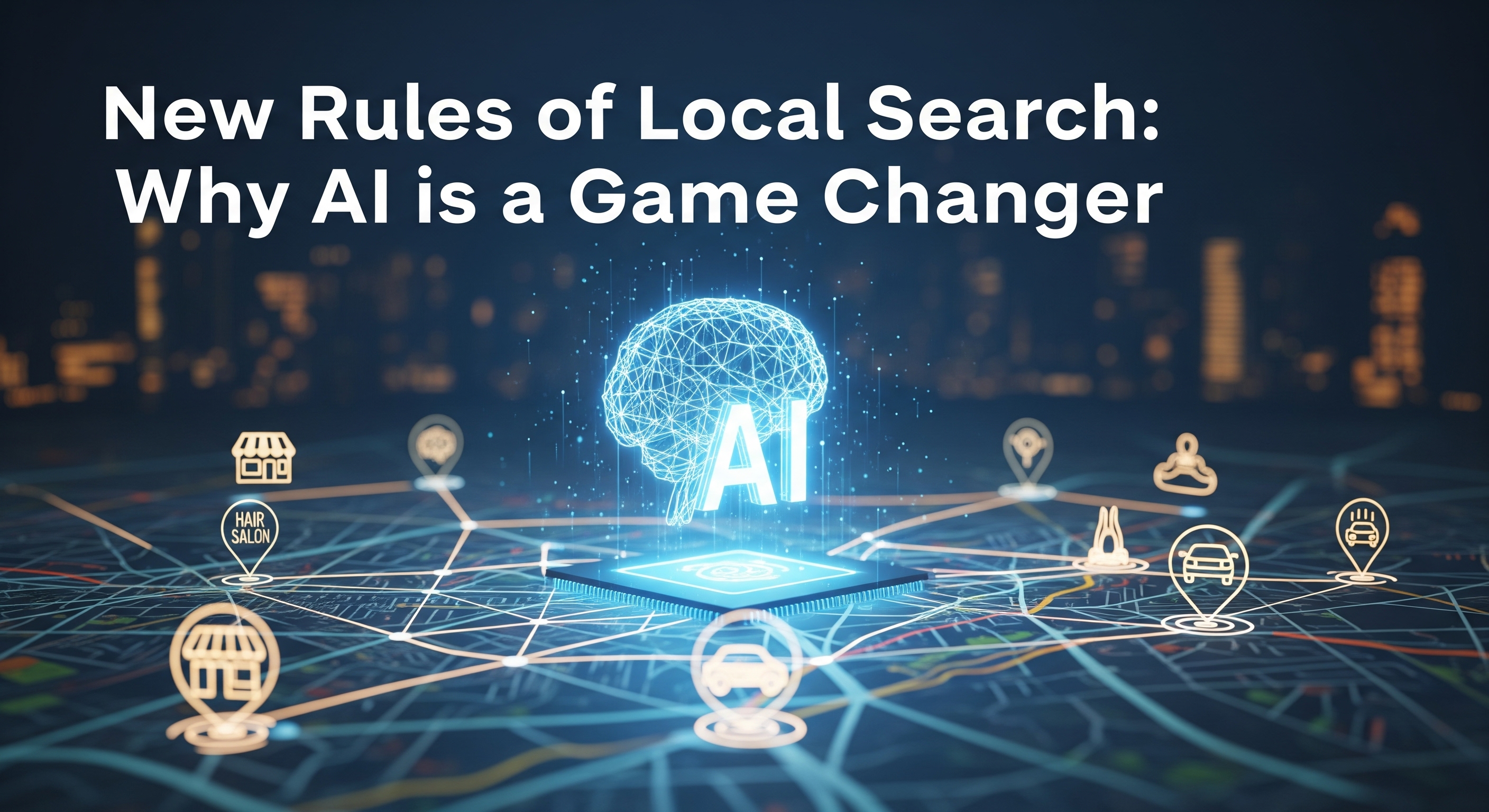
Remember when local SEO was all about getting your business listed on a few directories and hoping for the best? Those days are long gone. Today, the world of local search is being transformed by a powerful, invisible force: artificial intelligence (AI). What was once a simple process of keyword matching has become a sophisticated dance of data, user intent, and trust signals.
If your business relies on local customers, understanding how AI influences your rankings isn't just a good idea, it's a necessity. AI isn't just another search algorithm update; it's a fundamental shift in how search engines like Google understand the world and, more importantly, how they decide which businesses to show users.
So, how exactly does AI change the game, and what can you do to ensure your business thrives in this new era? Let's dive in.
For years, the foundation of SEO was simple: find a keyword, create a page for it, and build links. While keywords still matter, AI has made search engines incredibly good at understanding the intent behind a user's query.
This means your business can no longer just target "pizza restaurant." You need to provide rich, descriptive content that helps AI understand what makes your pizza unique. Think about the kinds of phrases a person might use when talking to a friend—that’s the language you want to optimize for.

Your Google Business Profile (formerly Google My Business) has always been the cornerstone of local SEO. In the AI-driven landscape, it's more important than ever. Think of it as your business's official resume for AI.
If there's one thing AI values, it's social proof. AI uses sentiment analysis to "read" and interpret the content of online reviews. It's not just about your star rating anymore. It's about what people are actually saying.
This engagement signals to AI that your business is not just a static listing but a vibrant, customer-focused entity. The more data and positive sentiment AI can glean from your reviews, the more it trusts your business, and the more likely it is to recommend you to users.
In the new AI world, the purpose of your content has shifted. It's no longer just about filling a page with keywords. It's about providing comprehensive, helpful, and contextually rich information that can be easily summarized by AI.
By creating content that is comprehensive and well-structured, you make it easy for AI to understand the true value of your business and its expertise.
AI thrives on fresh, real-time data. This is especially true for local businesses where hours of operation, events, and specials can change frequently.
A business that constantly updates its visual and textual information is seen by AI as more dynamic and reliable, which can improve its ranking.

The days of setting up your local listings and forgetting about them are over. To succeed in an AI-driven search landscape, your local SEO strategy must be proactive and continuous.
This proactive approach not only helps you rank better in local search but also builds trust with both AI and your potential customers. It’s about creating a comprehensive, credible, and up-to-date digital presence that AI can easily understand and recommend.
AI isn't a threat to local businesses; it's a powerful tool that rewards those who are authentic, transparent, and focused on providing value. By shifting your mindset from a focus on keywords to a focus on user intent, from a static listing to a dynamic digital hub, you can not only survive but thrive in this new era of local search.
The businesses that succeed will be the ones that see AI for what it is: a new, more sophisticated way for customers to find the best local options. The businesses that put in the work to build trust, provide comprehensive information, and engage with their community will be the ones that AI chooses to recommend.
Ready to take your local presence to the next level?
Ready to grow your business with a data-driven performance marketing strategy? Contact Finch today for a free consultation!
Traditional local SEO focused on basic ranking signals like keyword usage, consistent NAP data (Name, Address, Phone Number), and backlinks. While these are still important, AI-influenced local SEO goes deeper by prioritizing user intent, contextual relevance, and trust signals. AI algorithms analyze everything from the sentiment of your customer reviews to the descriptive language on your website to determine your business's true value and relevance to a specific user's query. It's a shift from simple keyword matching to understanding what a person is really looking for.
To optimize your Google Business Profile for AI-powered search, you must ensure all information is complete, accurate, and kept up-to-date. Regularly post updates, add new photos and videos, and use the "Q&A" and "Services" sections to provide detailed information that AI can use. Most importantly, actively manage and respond to all customer reviews, as AI uses this feedback to gauge your business's reputation and quality.
Detailed reviews are crucial because AI uses them for sentiment analysis. Instead of just looking at the star rating, AI reads the text of the reviews to understand the context. A review that says, "This place has the best vegan burgers!" provides a specific data point that can help your restaurant appear in a search for "vegan restaurants." This rich, descriptive data helps AI categorize your business more accurately, increasing its chances of appearing in hyper-specific, intent-driven searches.
To create AI-friendly content, focus on clarity, structure, and direct answers. Write in a conversational tone and use a question-and-answer format when appropriate. Use clear headings, subheadings, and lists to make your content scannable for both humans and AI. Implement structured data (Schema Markup) to help search engines understand the context of your content. Your goal should be to provide a comprehensive, authoritative answer to a user's question, making it easy for AI to pull out the key information for a summary.
AI Overviews, which are AI-generated summaries at the top of search results, can directly answer a user's question without them having to click through to your website. This might reduce website traffic for some informational queries. However, a strong AI Overview that references your business can significantly boost brand visibility and awareness. The key is to optimize your content so that your business is the one being referenced in the AI's summary. This can lead to increased brand trust and, ultimately, more direct conversions.